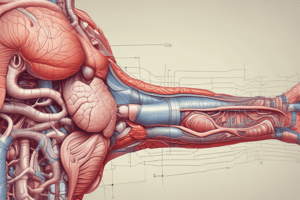Podcast
Questions and Answers
What is a key function of gut microbiota in the human body?
What is a key function of gut microbiota in the human body?
Which of the following hormones is NOT involved in the regulation of digestion?
Which of the following hormones is NOT involved in the regulation of digestion?
What condition is characterized by open sores in the lining of the stomach or small intestine?
What condition is characterized by open sores in the lining of the stomach or small intestine?
Which of the following statements about a healthy digestive system is true?
Which of the following statements about a healthy digestive system is true?
Signup and view all the answers
What common issue is characterized by difficulty passing stool?
What common issue is characterized by difficulty passing stool?
Signup and view all the answers
What is the primary function of the small intestine?
What is the primary function of the small intestine?
Signup and view all the answers
Which organ is responsible for the mechanical digestion of food through chewing?
Which organ is responsible for the mechanical digestion of food through chewing?
Signup and view all the answers
What substance does the liver produce that is essential for fat digestion?
What substance does the liver produce that is essential for fat digestion?
Signup and view all the answers
Which process involves the uptake of nutrients into the bloodstream?
Which process involves the uptake of nutrients into the bloodstream?
Signup and view all the answers
Which digestive enzyme is responsible for breaking down carbohydrates?
Which digestive enzyme is responsible for breaking down carbohydrates?
Signup and view all the answers
What is the role of the gallbladder in digestion?
What is the role of the gallbladder in digestion?
Signup and view all the answers
What describes the process of peristalsis?
What describes the process of peristalsis?
Signup and view all the answers
Which digestive organ is primarily involved in water and electrolyte absorption?
Which digestive organ is primarily involved in water and electrolyte absorption?
Signup and view all the answers
Study Notes
Overview of the Digestive System
- The digestive system is a complex network of organs and glands responsible for the breakdown and absorption of food.
- It converts ingested food into usable nutrients that provide energy, build and repair tissues, and regulate bodily functions.
- The process involves mechanical and chemical digestion of food, absorption of nutrients, and elimination of waste products.
Organs and Glands of the Digestive System
- Mouth: Mechanical digestion (chewing) and chemical digestion (saliva enzymes).
- Pharynx: Passageway for food and air, swallowing reflex.
- Esophagus: Muscular tube that transports food from the pharynx to the stomach via peristalsis.
- Stomach: Muscular sac that mixes and churns food, secretes gastric juices (HCl, pepsin).
- Small Intestine: Primary site for nutrient absorption, long and convoluted structure containing villi and microvilli.
- Large Intestine (Colon): Absorbs water and electrolytes from undigested material, forms and stores feces.
- Rectum: Stores feces until elimination.
- Anus: Opening for elimination of feces.
- Liver: Produces bile, crucial for fat digestion and absorption, filters blood, and processes nutrients.
- Gallbladder: Stores and concentrates bile.
- Pancreas: Secretes digestive enzymes (e.g., amylase, lipase) and hormones into the small intestine.
Processes of Digestion
- Ingestion: Taking food into the mouth.
- Mechanical Digestion: Physical breakdown of food (chewing, churning).
- Chemical Digestion: Breakdown of food into smaller molecules (enzymes).
- Absorption: Uptake of nutrients into the bloodstream.
- Elimination: Removal of undigested material as feces.
Key Functions of Digestive Organs
- Mouth: Begins mechanical and chemical digestion.
- Stomach: Mixes and churns food, initiates protein digestion.
- Small Intestine: Completes digestion and absorbs nutrients.
- Large Intestine: Absorbs water and electrolytes.
Digestive Enzymes
- Amylase: Breaks down carbohydrates.
- Pepsin: Breaks down proteins.
- Lipase: Breaks down fats.
- Other enzymes: Further break down specific nutrients in specific areas of the digestive tract.
Accessory Organs
- Liver: Produces bile, filters blood, processes nutrients.
- Gallbladder: Stores and concentrates bile.
- Pancreas: Secretes digestive enzymes and hormones.
Common Digestive Issues
- Heartburn: Acid reflux into the esophagus.
- Ulcers: Open sores in the lining of the stomach or small intestine.
- Constipation: Difficulty passing stool.
- Diarrhea: Frequent, loose stools.
- Irritable Bowel Syndrome (IBS): Group of symptoms affecting the large intestine.
- Crohn's disease: Inflammatory bowel disease.
Importance of a Healthy Digestive System
- Nutrient Absorption: Maximizes the intake of essential nutrients.
- Energy Production: Fuels bodily functions.
- Waste Removal: Eliminates toxins and metabolic waste.
- Immune Support: Supports immunity through the gut microbiota.
Regulation of Digestion
- Hormones: (e.g., gastrin, secretin, cholecystokinin) regulate the secretion of digestive enzymes and other processes.
- Nerve signals: Control muscle contractions involved in peristalsis.
Importance of Gut Microbiota
- Digestion and nutrient absorption: Aids in the breaking down of complex carbohydrates, fibers, and other foods.
- Immune system development: Trains and shapes the immune system to handle both pathogens and beneficial gut bacteria.
- Important for various bodily functions: Influences metabolism, immunity, and overall well-being.
Studying That Suits You
Use AI to generate personalized quizzes and flashcards to suit your learning preferences.
Description
Explore the intricate workings of the digestive system, including its main organs and functions. Understand how food is mechanically and chemically processed to provide essential nutrients for the body. This quiz will guide you through each component's role in digestion.




